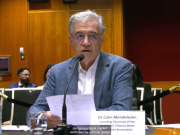Vaping, tobacco, and nicotine issues are on the ballot across the United States.
In the United States, November 3rd is the country’s national election day.
Former Vice President Joe Biden and incumbent Donald Trump are facing off for the position of U.S. president. Many lawmakers in the U.S. Senate and the House of Representatives are also up for reelection, thrusting the power of the executive and legislative branches of the federal government into a state of upheaval. Republicans currently face the chance of losing control of both the presidency and the US. Senate.
The Supreme Court of the United States, however, is strongly in the hands of conservative judges after Trump apologists confirmed ultra-conservative Amy Coney Barrett, aged 48, to the court for a lifetime appointment. Barrett, a social conservative, could be instrumental in repealing crucial laws that protect women’s civil liberties, people of color, LGBTQ people, and drug users. She has no vaping position, but she seems to be a potential hindrance to harm reduction efforts for tobacco, marijuana legalization, and vaping product protections for business owners and consumers.
Though outwardly concerned about vaping among youth in the U.S., Biden is actually more suggestible to effective harm reduction policies that cover all aspects of drug use rights for users of nicotine and other substances. However, several down-ballot issues could dramatically impact the tobacco and vaping industries across the fifty states and territories of the U.S. It also appears that the local ballot measures to change the state-to-state makeup of vaping and nicotine regulation.
By no means are we telling you how to vote if you live in these jurisdictions and are subject to the outcomes of a “yes” or “no” vote. This is merely an informational description of what’s on the ballot across several U.S. states.
Vaping Post presents our Ballot Measure Voting Guide for the 2020 U.S. Election
Colorado Proposition EE
Colorado, my home state, is dealing with Proposition (Prop.) EE. This ballot measure would drastically change the cigarette and vaping market across the state.
A “yes” vote for the proposition would support the creation of a tax on nicotine products that will finally cover e-cigarettes and other smoke-free products. Prop. EE will also increase cigarette and tobacco taxes and dedicate revenues to various health and education programs. A “no” vote counters this effort.
Opponents to Prop. EE recognizes that the ballot measure will not keep kids from using tobacco and nicotine products. Convenience stores, liquor stores that sell tobacco products, specialty tobacconists, and vape retailers are outwardly opposed to Prop. EE because of the increase in in-store expenditure for cigarette and tobacco sales.
If passed by voters on Nov. 3rd, Prop. EE would increase cigarette and tobacco product taxes and would create the new e-cigarette product tax. Currently, a 20 cents per pack tax rate is the law or one cent per cigarette per pack. Previously, the state passed constitutional Amendment 35 in 2004, which authorized a constitutional tax that tacks 64 cents per pack, or 3.2 cents per cigarette per pack. Proposition EE would set minimum price requirements that increase statutory cigarette tax rates to $1.80 per pack by July of 2027. The total state-level cigarette tax would then be $2.64 per pack—all funds generated by a Prop. EE tax would drive funds to the state’s general fund, the state education fund, tobacco education and prevention funds, and the rural schools’ fund.
Vaping Post reported on a lawsuit filed against Colorado and several officials alleging a “back-room” deal the government cut with Philip Morris USA and owner Altria Group. The lawsuit was brought by a class of discount cigarette makers who argue that Prop. EE will cartelize the Colorado cigarette market to one or two primary manufacturers.
Oregon Measure 108
Oregon voters will consider Ballot Measure 108 to increase the state’s tobacco tax levy further to fund health management policy and prevention education.
A “yes” vote supports the measure to increase taxes on tobacco products and “inhalant delivery systems” to cover e-cigarettes in the state law to fund the state’s various public assistance and safety-net programs for medical and healthcare-related matters. A “no” vote counters this measure.
If voters approve Measure 108, the state will increase taxes on tobacco products’ distributors and other nicotine delivery products like e-cigarettes. The cigarette tax will increase from $1.33 to $3.33 per 20-pack of cigarettes under the measure. Nicotine inhalant systems and electronic cigarettes will be charged at a 65 percent rate for these products’ wholesale sales price. The cigar tax cap will be set at the wholesale sales price of 65 percent and will not exceed $1.00 per cigar. That’s an increase from 50 cents.
Tax revenues from this ballot measure would be dedicated to the enforcement and administration of the tax. The other funds would be earmarked for the Oregon Health Authority — the state agency that manages public assistance and safety net plans for low-income individuals and other at-risk populations. These plans include Oregon’s Medicaid program, the Urban Indian Health Program, and programs that promote prevention and education concerning tobacco and nicotine-related health issues.
This ballot measure, if passed on Nov. 3rd, would be effective on January 1, 2021.
Oklahoma State Question 814
Voters in Oklahoma will decide State Question 814, which would decrease the total amount of funds paid from the state’s tobacco settlement endowment trust fund to the Medicaid and health safety-net programs. This ballot measure is considerably less controversial than a tax amendment or a prohibition. However, the real debate focuses on whether the Oklahoma state government should continue taking money from the Master Settlement Agreement funds the state is paid as apart of the benchmark settlement in 1998.
A “yes” vote for Question 814 supports decreasing the percentage of the money, from 75 percent to 25 percent, that is deposited in the state’s tobacco settlement endowment trust fund. The ballot question also permits the state to shift these funds to receive federal matching grants to fund the Oklahoma Medicaid program. A “no” vote counters this measure. The funds will be used to expand the state’s Medicaid program to expand adults’ eligibility between the age of 18 to 65 years, whose income exceeds 133 percent of the federal poverty line or below.
Though certainly late to the game, Oklahoma voters expanded Medicaid — per the provision of the Obama-era Affordable Care Act (Obamacare) — through State Question 802. This vote occurred in the state’s primary election, which took place on June 30. Republican leaders and Gov. Kevin Stitt support Question 814 to accommodate the expansion of Medicaid, per the June 30 vote of Question 802.
This story will be updated when information and the election results become available.












